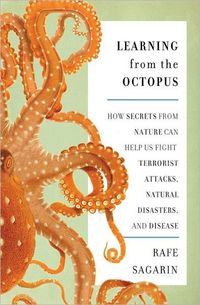

Purchase
Learning From the Octopus
Rafe Sagarin
How Secrets from Nature Can Help Us Fight Terrorist Attacks, Natural Disasters, and Disease
Basic Books
April 2012
On Sale: March 27, 2012
320 pages
ISBN: 0465021832
EAN: 9780465021833
Kindle: B007NJD1LQ
Hardcover / e-Book
Add to Wish List
Non-Fiction
Despite the billions of dollars we’ve poured into foreign
wars, homeland security, and disaster response, we are
fundamentally no better prepared for the next terrorist
attack or unprecedented flood than we were in 2001. Our
response to catastrophe remains unchanged: add another step
to airport security, another meter to the levee wall. This
approach has proved totally ineffective: reacting to past
threats and trying to predict future risks will only waste
resources in our increasingly unpredictable world.
In Learning from the Octopus, ecologist and security expert
Rafe Sagarin rethinks the seemingly intractable problem of
security by drawing inspiration from a surprising source:
nature. Biological organisms have been living—and
thriving—on a risk-filled planet for billions of years.
Remarkably, they have done it without planning, predicting,
or trying to perfect their responses to complex threats.
Rather, they simply adapt to solve the challenges they
continually face.
Military leaders, public health officials, and business
professionals would all like to be more adaptable, but few
have figured out how. Sagarinargues that we can learn from
observing how nature is organized, how organisms learn, how
they create partnerships, and how life continually
diversifies on this unpredictable planet.
As soon as we dip our toes into a cold Pacific tidepool and
watch what we thought was a rock turn into an octopus,
jetting away in a cloud of ink, we can begin to see the how
human adaptability can mimic natural adaptation. The same
mechanisms that enabled the octopus’s escape also allow our
immune system to ward off new infectious diseases, helped
soldiers in Iraq to recognize the threat of IEDs, and aided
Google in developing faster ways to detect flu outbreaks.
While we will never be able to predict the next earthquake,
terrorist attack, or market fluctuation, nature can guide us
in developing security systems that are not purely reactive
but proactive, holistic, and adaptable. From the tidepools
of Monterey to the mountains of Kazakhstan, Sagarin takes us
on an eye-opening tour of the security challenges we face,
and shows us how we might learn to respond more effectively
to the unknown threats lurking in our future.
Comments
No comments posted.
Registered users may leave comments.
Log in or register now!
| 


 © 2003-2025 off-the-edge.net
all rights reserved Privacy Policy
© 2003-2025 off-the-edge.net
all rights reserved Privacy Policy